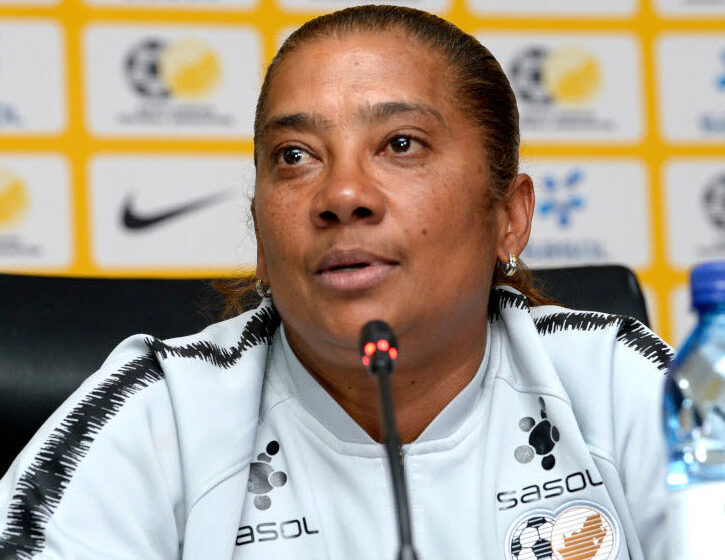Desiree Ellis: How South Africa Women’s coach lives in shadows of neglect

South Africa Women’s head coach, Desiree Ellis. Photo Credit- Osasu/X
In the vibrant world of women’s football, few names shine as brightly as Desiree Ellis. The head coach of South Africa’s national women’s team, Banyana Banyana, has etched her name into the annals of African football history with a string of remarkable achievements. From leading her team to a historic victory at the 2022 Women’s Africa Cup of Nations to earning the CAF Women’s Coach of the Year award four consecutive times (2018–2023), Ellis is a beacon of excellence. Yet, beneath this success lies a troubling narrative of neglect and undervaluation, a story that has recently resurfaced amid a contract dispute with the South African Football Association (SAFA).
Desiree Ellis legacy of triumph
The journey of Desiree Ellis in soccer is nothing short of inspirational. A former player who retired in 2002 at the age of 39, she transitioned seamlessly into coaching, taking the helm of Banyana Banyana in 2016 as interim manager before being officially appointed in 2018. Under her guidance, the team, once ranked 50th in the world, soared to new heights. The 2018 Women’s Africa Cup of Nations saw them finish as runners-up, securing a historic qualification for the 2019 FIFA Women’s World Cup, their first-ever appearance on that global stage. In 2022, she led Banyana Banyana to their maiden continental title in Morocco, a triumph that cemented her status as a trailblazer. Her crowning achievement came in 2023 when the team reached the round of 16 at the FIFA Women’s World Cup, defeating Italy along the way, a feat that earned her yet another CAF accolade.
The South African government recognized her contributions with the National Order of Ikhamanga in 2023, a testament to her impact both on and off the pitch. Yet, despite these accolades, Ellis finds herself at a crossroads, her professional future clouded by uncertainty.
RELATED STORIES
WAFCON: South Africa vs Senegal preview — prediction, team news, key players to watch, others
WAFCON: Ex-Banyana Banyana captain mentions what South Africa must do to beat Senegal
Desiree Ellis vs SAFA contract conundrum
The issue came to light in a recent X post by journalist Osasu Obayiuwana on July 16, 2025. Citing a conversation with someone close to Desiree Ellis, Obayiuwana revealed that the coach’s contract with SAFA expired seven months ago, leaving her in a precarious position. “They know she hasn’t got a lot of options in South Africa,” the source told Obayiuwana. “But that is no excuse for them to treat her very poorly. I know that she is certainly not happy with how she is being treated.”
This revelation has sparked outrage among fans and analysts alike, with many pointing to a broader pattern of mistreatment of indigenous coaches across the continent. A 2022 FIFA report highlighted that only 12% of national team coaches in Africa are locally hired, a statistic that underscores the systemic challenges faced by homegrown talent like Ellis. Replies to Obayiuwana’s post echoed this sentiment, with users like @Willyrep noting, “Unfortunately, that is how indigenous and patriotic coaches are treated (most especially in West Africa). I am quite surprised it happens in Southern Africa as well.”
The lack of a new contract raises questions about SAFA’s commitment to women’s soccer, especially when contrasted with the federation’s recent partnerships, such as the May 2025 renewal with Hollywoodbets to support the women’s game. If Ellis’s treatment is indicative of deeper issues, it suggests a disconnect between SAFA’s public statements and its actions.
The implications of Desiree Ellis neglect
The source close to Desiree Ellis hinted at a possible exit strategy, suggesting she might leap at an opportunity to coach in the United States, perhaps in college soccer. This prospect aligns with a 2023 study in the Journal of Sport Management, which found that 68% of female coaches globally face inequitable contract renewals compared to their male counterparts, often driving them to seek opportunities abroad. For Ellis, a move to the U.S. could offer the respect and resources she deserves, though no such offer has materialized yet.
This potential departure would be a loss not just for South Africa but for African women’s soccer as a whole. Ellis’s success has inspired a generation, breaking barriers in a sport where, according to a 2024 FIFA benchmarking study, the average global gross player salary is a mere $10,900, and only 22% of head coaches are female. Her story mirrors the broader challenges outlined in a 2024 UEFA report, which noted that the growth of women’s soccer in regions like Africa often outpaces the investment needed to sustain it.
RELATED STORIES
Understanding Why Female Footballers Earn Less than Male Footballers
WAFCON: Nigeria vs Zambia — prediction, H2H, key players to watch, other details
Conclusion
The X thread following Obayiuwana’s post reflects a groundswell of support for Ellis. Users like @digyoris suggested she take on Nigeria’s Super Falcons after the 2025 WAFCON, while others, such as @atekbbr, lamented, “It’s not only NFF that is shit at taking care of their coaches.” These comments highlight a shared frustration with the treatment of coaching talent across the continent, where infrastructure and investment lag behind the sport’s potential.
Desiree Ellis deserves better. Her track record: 23 wins in 32 matches as a player, a 2022 COSAFA Cup victory, and a transformative tenure with Banyana Banyana, speaks volumes. Currently, the soccer world watches and waits. Will SAFA step up to honor her contributions, or will Ellis’s next chapter unfold on foreign soil? For now, her story remains a powerful reminder of the talent thriving in the shadows and the urgent need to shine a light on it.

